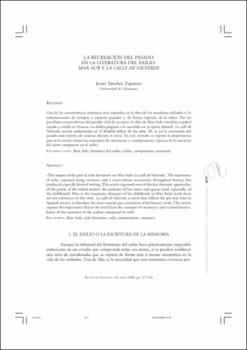La recreación del pasado en la literatura del exilio: Max Aub y La calle de Valverde
Author
Sánchez Zapatero, JavierDate
2008Abstract
Una de las características temáticas más repetidas en la obra de los novelistas exiliados es la
rememoración de tiempos y espacios pasados y, de forma especial, de la niñez. Por las
peculiares características del periplo vital de su autor, la obra de Max Aub, novelista español
nacido y criado en Francia, no dedica páginas a lo sucedido en su época infantil. La calle de
Valverde, novela ambientada en el Madrid bélico de los años 30, es así la recreación del
pasado más remota de cuantas efectuó el autor. En este artículo se expone la importancia
que en la novela tienen los conceptos de «memoria» y «compromiso», básicos de la narrativa
del autor compuesta en el exilio. The experience
of exile, repeated along centuries and a cross-culture occurrence throughout history, has
produced a specific kind of writing. This article expounds one of this key thematic approaches
of the poetic of the exiled writers: the memory of last times and spaces (and, especially, of
the childhood). Due to the traumatic character of his childhood, in Max Aub’s work there
are not references to this time. La calle de Valverde, a novel that reflects the pre-war time in
Spanish society, is therefore the most remote past recreation of his literary work. This article
exposes the importance that in the novel have the concepts of «memory» and «commitment»,
basics of the narrative of the author composed in exile.





